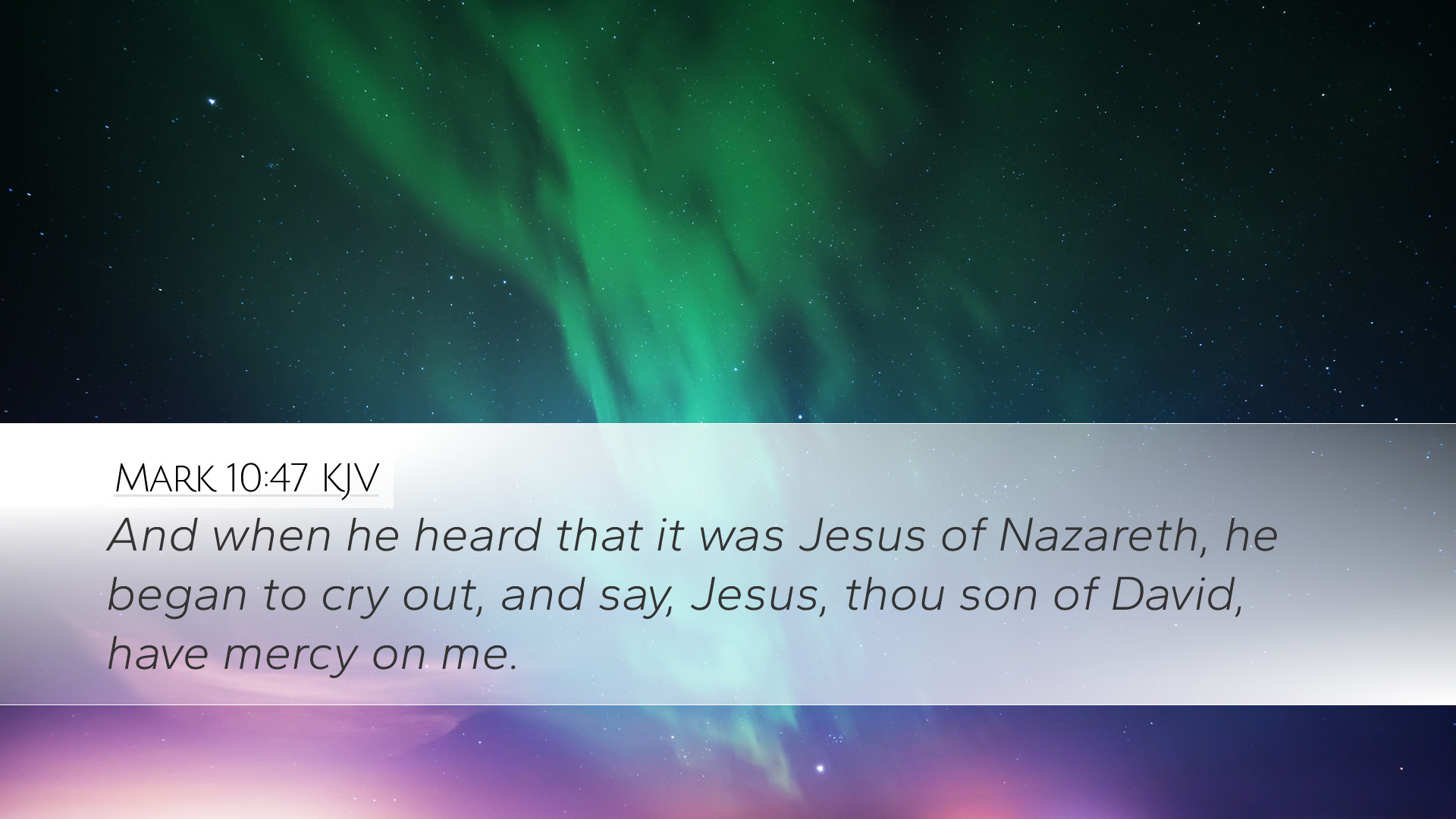Commentary on Mark 10:47
Verse Context: Mark 10:47 captures a pivotal moment in the Gospel narrative where Bartimaeus, a blind beggar, cries out to Jesus for mercy. This event occurs as Jesus is leaving Jericho, demonstrating the interaction between faith and desperation.
Insight from Matthew Henry
Matthew Henry notes the significance of Bartimaeus being identified as the “son of Timaeus,” which may serve not only to establish his lineage but also indicates a prevalent social context of naming in the community. This identification serves as a call to authenticity, where believers are encouraged to acknowledge their condition before the Lord.
Henry further emphasizes Bartimaeus’s persistent faith in the face of opposition. Despite being rebuked by the crowd, his cries for mercy did not wane. This persistence illustrates the vigor with which believers should approach God, especially in seasons of distress. Henry states:
“True faith will venture through the crowd to get to Christ; it will not be discouraged by the frowns of the world.”
Reflection on Faith and Persistence
In this light, pastors and theologians can draw insights about the nature of faith. Bartimaeus symbolizes the believer's journey toward spiritual enlightenment. His blindness is not merely physical—it represents spiritual and existential blindness that every disciple may experience. The fervent plea for mercy serves as a reminder that desperation often leads to divine encounters.
Commentary by Albert Barnes
Albert Barnes comments on the implications of Bartimaeus’s cry, observing that his recognition of Jesus as the “Son of David” signifies an understanding of Jesus's messianic identity. This acknowledgment is significant in Jewish tradition, where lineage is tied deeply to divine promise. Barnes explains:
“His calling Jesus the ‘Son of David’ was a profession of faith; it showed that he believed him to be the Messiah.”
Barnes also highlights the importance of this recognition as it displays a profound understanding of Jesus's role in fulfilling Old Testament prophecies. Bartimaeus’s faith in Jesus’s ability to heal is not merely wishful thinking but is rooted in theological understanding.
The Role of Divine Mercy
This verse invites readers to reflect on the nature of mercy. Both Henry and Barnes illustrate that God's mercy is accessible to all, irrespective of societal status. Bartimaeus, as a beggar and blind man, represents marginalized voices in society. The act of calling out signifies both a personal need and a communal call for recognition of the marginalized.
Insights from Adam Clarke
Adam Clarke provides an eloquent discourse on the societal implications of Bartimaeus’s actions. He notes that the crowd attempted to silence Bartimaeus, implying that societal norms often suppress cries for help, particularly from those considered insignificant or unworthy. Clarke states:
“The applause of the many often drowns out the cries of the vulnerable, yet faith calls for boldness in the face of such oppression.”
This serves as a powerful reminder for congregations and community leaders to foster environments where cries for help are heard and validated. Clarke's commentary underlines the importance of not being swayed by societal pressures but rather aligning with divine truth that calls for justice and mercy.
Theological Implications of Crying Out
The act of calling out to Jesus is more than an appeal for physical healing; it is a theological statement about the nature of God’s character—compassionate and attentive. This aspect of divine engagement is crucial for understanding how faith communities can embody the heart of Christ by listening and responding to the cries of the broken.
Personal Application for Believers
For pastors and leaders, Mark 10:47 serves as a profound invitation to cultivate a posture of listening and responsiveness in their ministries. Bartimaeus’s insistence upon calling out amid opposition illustrates a powerful principle: true faith often requires boldness and perseverance. In practical terms, this can lead to creating ministries that prioritize outreach to the marginalized and those in need, resonating with the inclusive message of the Gospel.
Conclusion
In conclusion, Mark 10:47 calls believers to reflect on their own spiritual conditions, the nature of their faith, and their response to those in need. The combined insights from Matthew Henry, Albert Barnes, and Adam Clarke enrich our understanding of this text, revealing layers of meaning that challenge and inspire. Through the figure of Bartimaeus, we see a model of faith that not only reaches out for divine help but also teaches us to advocate for others who find themselves in similar positions of need.


